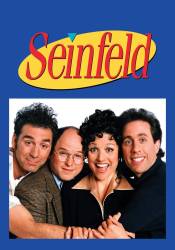Factual error: The grocery store that Kramer walks into with Little Jerry has a round doorknob. Those were phased out of public use in 1992 after the Americans with Disabilities Act took effect, but this episode takes place in 1997. (00:09:45)
Audio problem: When Kramer is telling Jerry about Little Jerry as he exits The Apartment, Kramer finishes his sentence with the word "jealous", and the S is audibly cut off in the middle, as if the audio was spliced there. (00:14:25)
Continuity mistake: When Celia breaks out of prison and comes to George's apartment, George opens the door and starts talking with her. After George says "And you decided to pop in" the shot shows Celia but the door has now closed behind her. It would have been impossible to close without us seeing it because Celia would have had to have moved forward to close the door.
Factual error: On the bottom of all checks, they have the routing number, followed by the account number, followed by a repeat of the check number found in the top right corner. When we see Jerry's bounced check, "1246" isn't seen after the account number.






Answer: The name is Delores. He shouts that name at the end of the episode. Then in a later episode, "The Foundation", he runs into her. And he repeatedly calls her Delores.